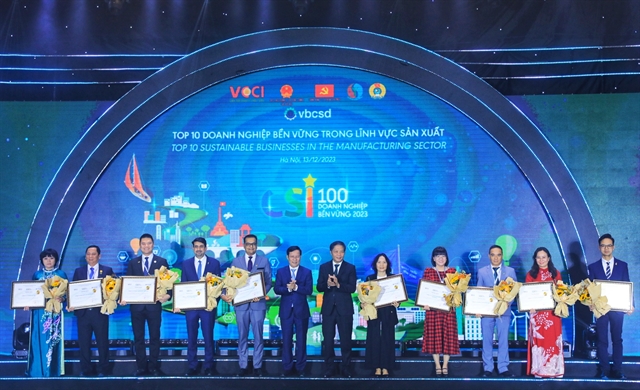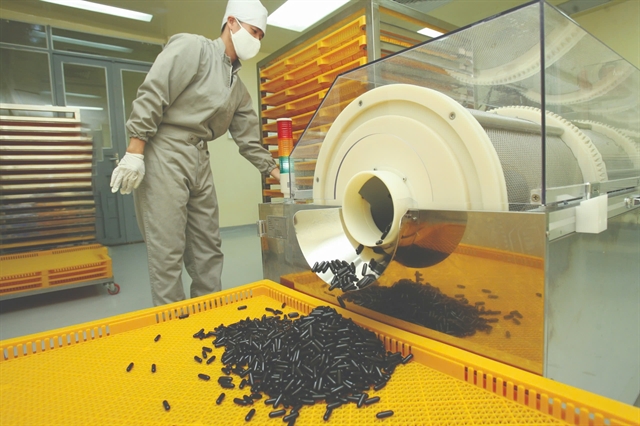.JPG) |
| Traphaco’s technician provides guidance to ethnic farmers in Sa Pa on cultivating artichokes in accordance with GACP-WHO standards. — Photo courtesy of Traphaco |
By Vũ Hoa
Nature-based solutions (NbS) not only help businesses manage risks and achieve economic benefits but also enhance their reputation, brand value, and commitment to social and environmental responsibility—a direction more companies are increasingly pursuing.
“NbS leverage ecosystems and natural processes to address social, economic, and environmental challenges. These solutions protect and restore nature while fostering economic and social well-being within communities,” said Nguyễn Quang Vinh, vice chairman of the Việt Nam Chamber of Commerce and Industry (VCCI) and Chairman of the Việt Nam Business Council for Sustainable Development (VBCSD).
According to the World Bank, NbS are expected to contribute to 37 per cent of global greenhouse gas emission reductions by 2030 under the Paris Agreement. They not only mitigate climate change but also enhance resilience and support environmental recovery after natural disasters.
Data from ClimateWatch indicates that NbS are a crucial component of many countries’ climate change adaptation and mitigation strategies. Fifty-seven nations have integrated NbS into their national climate pledges under the Paris Agreement. NbS also play a key role in the Global Stocktake, a mechanism within the Paris Agreement that oversees implementation and evaluates progress towards climate goals.
Speaking at the 26th United Nations Climate Change Conference of the Parties (COP26), Prime Minister Phạm Minh Chính emphasised the importance of basing all climate actions on nature, with people at the centre of sustainable development. This principle guides government bodies, businesses and citizens, underscoring Việt Nam’s commitment to climate action and ecological restoration.
Vinh said: “In this context, it is clear that Nature-based Solutions (NbS) will become a key priority for governments and business communities globally, including in Việt Nam.”
Nguyễn Sỹ Linh, head of the Department of Climate Change and Global Issues at the Institute of Strategy and Policy on Natural Resources and Environment (under the Ministry of Natural Resources and Environment), noted the growing global trend towards sustainable development in harmony with nature. He said that businesses must recognise and capitalise on the benefits of nature in their operations, while ensuring environmental responsibility.
“In practice, many businesses, depending on their size and industry, have adopted sustainable development models with significant positive outcomes,” Linh said.
 |
| Top 10 sustainable businesses (CSI) in the manufacturing sector in Việt Nam 2024. NbS elevate businesses’ reputation and brand value. — Photo courtesy of VBCSD |
Phạm Hoàng Hải, Head of Partnership Relations at the VBCSD Secretariat, outlined three key benefits of NbS for enterprises:
Firstly, these solutions enhance businesses’ reputation, brand value, and social responsibility, aligning them with international standards and strengthening their position in the global value chain. They also improve transparency and accountability in production and business operations.
Secondly, NbS generate holistic value and co-benefits, providing environmental, economic, and social advantages for all stakeholders involved. They ensure equity, integration, and inclusivity within local communities and across the enterprise’s value chain.
Lastly, NbS improve risk management and financial efficiency, helping businesses adapt to challenges posed by climate change, extreme weather, and natural disasters. These solutions support the development of projects and initiatives that enhance economic efficiency while gradually restoring ecosystems.
 |
| A medicine production line at Traphaco. Focusing on the sustainable cultivation of medicinal herbs ensures top-notch quality. —Photo courtesy of Traphaco |
Đào Thúy Hà, deputy general director of Traphaco JSC, highlighted that adopting NbS led to growth and benefits for stakeholders.
“Traphaco has embraced sustainable development as our core mission. For the past 15 years, we have led the GreenPlan project, focusing on the sustainable cultivation of medicinal herbs in accordance with GACP-WHO standards,” she said.
“Traphaco’s herb-growing zones operate under a ‘four-party’ model involving farmers, the company, scientists, and the Government. These zones use advanced cultivation techniques to ensure high quality. Additionally, we support local farmers in planting, nurturing, and harvesting products according to strict procedures, improving their livelihoods and incomes.
“Currently, Traphaco has established eight medicinal herb growing zones adhering to these standards. Our commitment to sustainability has enabled us to produce high-quality oriental medicine products, earning consumer trust and improving our operational efficiency.”
Lê Thị Hồng Nhi, deputy general director of External Communications and Sustainable Development at Unilever Vietnam, emphasised the increasing consumer demand for sustainable brand development.
Surveys indicate that over 80 per cent of Gen Z consumers prefer products from brands that lead in social causes, particularly those focused on environmental objectives and sustainable development.
Moreover, companies that adopt sustainable practices not only contribute positively but also attract top talent. A growing trend shows that professionals are increasingly drawn to companies that prioritise sustainability.
Nhi pointed out that governments worldwide, including Việt Nam, were committing to sustainable growth, making it a critical necessity for businesses.
“Given the rising sea levels and global warming, no enterprise can succeed without balancing profitability and environmental stewardship. At Unilever, we firmly believe that business growth is closely tied to social sustainability. As part of our commitment to fostering sustainable consumption, we are dedicated to embarking on a green transformation,” Nhi said.
NbS present significant opportunities for businesses. However, Phạm Thị Cẩm Nhung, Climate & Energy Programme coordinator at WWF-Vietnam, has noted that companies face various challenges, particularly financial ones, when adopting this model.
Globally, public sector investment dominates annual NbS financial investment, accounting for 86 per cent, or US$133 billion, while the private sector contributes only 14 per cent, or $18 billion. By 2030, the global financial demand for NbS is projected to reach $8 trillion.
“The relatively low investment from the private sector could be due to a lack of awareness and an underestimation of the benefits. This may also be linked to the lengthy implementation processes of NbS and unclear criteria and challenges in accessing financial support,” Nhung said.
To encourage businesses to adopt nature-based strategies, Nhung suggested four solutions: establishing supportive mechanisms, policies, and incentives for NbS; leveraging the potential of the carbon market to create mutual benefits for the environment, society, and business profitability; integrating NbS into business frameworks and demonstrating their economic viability; and offering preferential policies to incentivize investment in NbS.
Experts recommend a structured five-step approach for businesses to successfully implement NbS: assessing business needs and available resources; building strategies and plans that integrate NbS into business operations; developing and implementing projects; monitoring and evaluating progress; and raising awareness through training. — VNS
- Reduce Hair Loss with PURA D’OR Gold Label Shampoo
- Castor Oil Has Made a “Huge” Difference With Hair and Brow Growth
- Excessive hair loss in men: Signs of illness that cannot be subjective
- Dịch Vụ SEO Website ở Los Angeles, CA: đưa trang web doanh nghiệp bạn lên top Google
- Nails Salon Sierra Madre
 VnExpress News The News Gateway of Vietnam
VnExpress News The News Gateway of Vietnam




